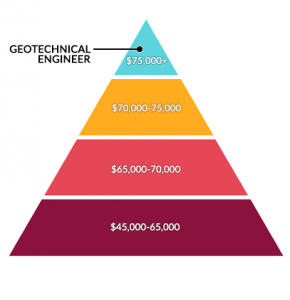More About Geotheta
More About Geotheta
Blog Article
Fascination About Geotheta
Table of ContentsThe Single Strategy To Use For Geotheta8 Easy Facts About Geotheta ShownEverything about GeothetaExcitement About GeothetaGeotheta Things To Know Before You Buy

They carry out site examinations, gather samples, perform laboratory tests, and assess data to review the suitability of the ground for building and construction tasks - Engineer of Record. Based upon their searchings for, geotechnical designers provide suggestions for structure style, slope security, retaining structures, and reduction of geotechnical dangers. They team up with other specialists, such as designers, architectural engineers, and building teams, to make certain that geotechnical factors to consider are incorporated into the general task style and application
By evaluating the behavior and properties of soil and rock, they can recognize prospective geotechnical hazards such as landslides, dirt settlement, or slope instability. Their proficiency assists protect against failures or crashes that could threaten lives and property. Here are some in-depth tasks and obligations of a geotechnical designer: Website Investigation: Geotechnical engineers conduct website examinations to collect data on subsurface conditions.
They analyze the data to recognize the properties and behavior of the soil and rock, including their toughness, permeability, compaction features, and groundwater problems. Geotechnical Analysis and Layout: Geotechnical designers assess the information collected throughout website investigations to evaluate the security and suitability of the site for construction jobs. They carry out geotechnical computations and modeling to assess elements such as bearing capability, negotiation, incline security, lateral earth pressures, and groundwater flow.
Getting The Geotheta To Work
Foundation Style: Geotechnical designers play a critical role in designing structures that can safely support the desired structure. They evaluate the soil problems and load needs to determine the proper foundation kind, such as shallow structures (e.g., footings), deep foundations (e.g (https://www.goodreads.com/user/show/180594840-ian-hammond)., stacks), or specialized methods like soil renovation. They take into consideration aspects such as settlement limitations, birthing ability, and soil-structure communication to develop optimum foundation designs
They examine construction strategies, screen website activities, and conduct area examinations to verify that the style referrals are followed. If unexpected geotechnical problems develop, they assess the situation and supply suggestions for removal or adjustments to the style. Danger Evaluation and Reduction: Geotechnical designers analyze geotechnical threats and dangers connected with the task website, such as landslides, liquefaction, or dirt erosion.

Partnership and Interaction: Geotechnical designers function carefully with other professionals involved in a task, such as engineers, architectural engineers, and construction teams. Reliable interaction and partnership are vital to incorporate geotechnical factors to consider right into the general project layout and construction process. Geotechnical designers offer technical knowledge, solution queries, and ensure that geotechnical needs are met.
Little Known Facts About Geotheta.
Right here are some kinds of geotechnical designers: Structure Designer: Structure engineers specialize in developing and analyzing foundations for frameworks. They analyze the dirt problems, tons requirements, and site features to identify the most suitable structure kind and style, such as superficial structures, deep structures, or specialized strategies like heap foundations.
They evaluate the elements influencing slope security, such as dirt homes, groundwater problems, and incline geometry, and establish strategies to avoid incline failures and alleviate risks. Quake Engineer: Quake designers focus on examining and developing frameworks to hold up against seismic forces. They assess the seismic risk of a site, evaluate dirt liquefaction potential, and create seismic layout requirements to guarantee the security and strength of structures during earthquakes.
They perform field screening, gather samples, and examine the accumulated information to characterize the soil buildings, geologic formations, and groundwater problems at a website. Geotechnical Instrumentation Engineer: Geotechnical instrumentation engineers focus on surveillance and gauging the actions of dirt, rock, and frameworks. They mount and keep instrumentation systems that keep track of variables such as soil settlement, groundwater levels, slope activities, and architectural variations to assess performance and supply very early cautions of prospective issues.
Top Guidelines Of Geotheta
They conduct tests such as triaxial tests, consolidation examinations, direct shear tests, and permeability examinations to collect information for geotechnical evaluation and layout. Geosynthetics Designer: Geosynthetics designers specialize in the layout and application of geosynthetic products, such as geotextiles, geogrids, and geomembranes. They utilize these materials to enhance soil security, reinforce slopes, supply drain services, and control linked here disintegration.
They have a tendency to be investigative individuals, which means they're intellectual, reflective, and investigative. They are curious, methodical, rational, logical, and logical. Some of them are also social, suggesting they're kind, generous, cooperative, individual, caring, useful, empathetic, tactful, and friendly. Does this seem like you? Take our complimentary profession test to figure out if geotechnical designer is one of your top job matches.
In the office atmosphere, geotechnical engineers use specialized software tools to perform calculations, develop styles, and examine information. They prepare records, testimonial job specifications, interact with clients and team members, and coordinate task activities. The workplace setting supplies a conducive setting for research study, evaluation, and collaboration with various other professionals involved in the task.
Some Known Details About Geotheta
They often see task sites to carry out website examinations, evaluate geotechnical conditions, and collect data for evaluation. These visits involve taking a trip to different places, in some cases in remote or challenging terrains. Geotechnical designers may execute dirt sampling, conduct tests, and monitor construction activities to guarantee that the geotechnical elements of the job are being executed properly.
Geotechnical designers additionally operate in specialized geotechnical labs. In these centers, they conduct experiments, execute examinations on soil and rock samples, and analyze the design buildings of the materials. Geotechnical research laboratory engineers function thoroughly in these environments, managing screening equipment, operating instruments, and videotaping data. They collaborate with other lab staff to make sure precise and reliable screening results.
Report this page